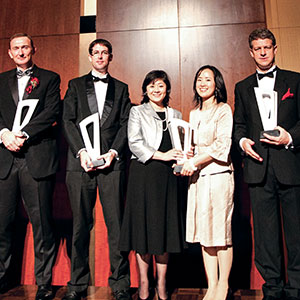Politics, economy and global concerns
This is the Year of the Sheep, according to the Chinese zodiac. Chinese New Year’s Day is on 19 February, but the year formally begins on the first day of spring—4 February—according to the Chinese astrology calendar.
Since this year the sheep takes wood as its element, it is often referred to as the Year of the Green Wooden Sheep. Let us hope it will be green indeed!
I wrote, as recently as last November, about ever-growing global environmental concerns.
Since then, there have been yet more examples of highly unusual weather conditions: another super typhoon hit the Philippines and a drought-stricken California experienced torrential rains that triggered devastating mudslides.
December also saw a disappointing United Nations Climate Change Conference in Lima, Peru, where very little progress was made at resolving differences between the developed and developing worlds in relation to environmental impact.
As the year of the volatile horse gallops away, the hope must be that it will take with it much of the instability and insecurity that plagued us through 2014.
The scourge of Ebola in Africa—and the threat that it could easily result in an epidemic elsewhere—was a sharp reminder that mankind must remain diligent.
In the Middle East, we saw continued unrest and bloodshed, the particular flashpoints being Syria and the West Bank. Throughout the region, we witnessed, with justifiable horror, the undiluted evil that is ISIS, the extremist jihadist rebel group based in Iraq and Syria.
Just as worrying is the radicalisation of young Muslims in towns and cities across the UK and the US and, who knows, perhaps even in Japan.
Islam is in great danger of being terminally demonised because of the minority. Anyone who has read the Quran knows that it is a work of sometimes great compassion.
On a personal level, I find it distressing that my Muslim friends are in danger of being judged wrongly because of the renegade few.
Domestically, what promised to be a pivotal year for the Japanese economy turned out to be a massive disappointment: full-on recession and huge questions left hanging over Abenomics, as well as a national debt equal to about 240% of GDP.
In what many saw as a costly—and wasteful—attempt to secure a new mandate, Prime Minister Shinzo Abe called a snap election which, predictably, he won by a large margin.
But, the turnout by voters was the lowest in any Japanese post-war election. The result ensures there will be no hike in the consumption tax in 2015, but it is also likely to further encourage Abe in his highly unpopular desire to change the Japanese Constitution.
British politics, too, was not exactly without its moments in 2014.
The rise and rise of the UK Independence Party (UKIP), led by the pint-swilling Nigel Farage (he of the great grimace), is easy to understand even if you are not a follower of his increasingly eccentric convictions.
When he was late for a meeting in December, he blamed his tardiness on traffic jams caused by immigrants.
But, he is a magnet for the many ordinary British men and women who, thoroughly disillusioned with Prime Minister David Cameron and his “house of toffs” coalition government, see absolutely no chance of Ed “Bacon Sandwich” Milliband leading Labour to victory in any future general election.
The prospect of a UKIP majority, however, is not something for which one would devoutly wish.
The referendum on Scottish independence turned out to be something of a non-event, though it has triggered unrest in some of the English regions, who now want the same sort of autonomy that has been granted to those north of the border.
Additionally, the old nettle that is Europe has once again risen to sting the hand that feeds it, with David Cameron vowing not to give in to demands that the UK make a huge additional contribution to the Brussels budget.
This has fuelled further speculation that the UK could very well withdraw from the European Union. The potential consequences of that are no doubt something to be addressed again in the Year of the Green Wooden Sheep.






